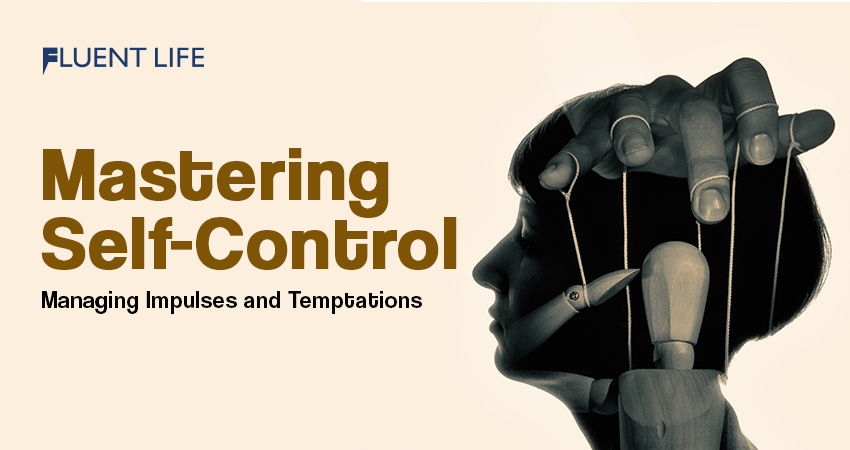To master self-control and effectively manage impulses and temptations, familiarize yourself with the introduction of this topic. Gain insights into the definition of self-control and understand the importance it holds in personal growth and success.
Definition of Self-Control
Self-control is the foundation of personal growth. It involves being able to manage emotions, actions, and urges. This capacity to overcome temptation is key for success.
One with self-control can wait for future rewards instead of just grabbing pleasure right away. By being restrained and making thoughtful decisions, individuals can resist short-term wishes for long-term advantages. In this way, they avoid impulsive choices that may stop them from advancing.
Moreover, self-control is essential for healthy relationships. It helps people communicate properly by curbing harsh language or deeds during disagreements. Moreover, it encourages folks to be understanding and sympathetic, creating unity and collaboration.
Throughout history, we can see the magnitude of self-control. Like Mahatma Gandhi, who kept devoted to peaceful protest rather than violent acts during India’s struggle for freedom. His huge willpower and self-discipline were evident, eventually leading India to independence.
Importance of Self-Control in Personal Growth and Success
Self-control is key for personal growth and success. It lets people make conscious decisions, resist temptation, and stay focused on the long-term. It acts like a guide, helping them overcome challenges, adapt to change, and maintain discipline in life.
For healthy living, self-control is essential. It helps resist unhealthy temptations and make better choices. It also contributes to better physical and mental health, plus productivity.
To succeed professionally, self-control is necessary. It helps manage time, prioritize tasks, and produce high-quality work. It also helps handle workplace conflicts calmly and professionally.
Emotionally, self-control impacts relationships. By exercising restraint, people can communicate better with others.
To cultivate self-control, practice mindfulness techniques like meditation or deep breathing. Set specific goals and break them down into milestones. Surround yourself with like-minded individuals who value self-discipline. Engage in activities that challenge willpower.
Also Read: The Role of Humor in Engaging English Conversations
Understanding Impulses and Temptations
To understand impulses and temptations, dive into the sub-sections explaining impulses and temptations and identifying common triggers. By exploring these components, you can gain valuable insights into how self-control works and develop effective strategies to manage impulses and resist temptations effectively.
Explaining Impulses and Temptations
Impulses and temptations are a constant battle. These are sudden urges that lead us astray from our rational thinking and long-term goals. To manage them, understanding them is essential.
Impulses are spontaneous desires or urges. They are reactions without much thought or consideration. Temptations are deliberate attractions towards things or actions that go against our values.
To manage them, awareness is key. Being mindful of thoughts, feelings, and behaviors can help us recognize patterns and triggers. This allows us to pause and evaluate before giving in to gratification.
Developing coping mechanisms is another strategy. Find healthy outlets for stress or negative emotions. Engage in physical activities, get support from loved ones, or practice relaxation techniques like meditation.
Creating a supportive environment is also important. Surround yourself with people who have similar goals and values. Set clear boundaries – both internally and externally – to resist impulsive reactions.
Identifying Common Triggers – Self Control
Comprehending Impulses & Temptations
Common Triggers:
- External Influences: Ads, social media & surroundings can set off impulses.
- Emotional State: Stress, loneliness & sadness often causes impulse-driven behavior.
- Personal Habits: Some routines & behaviors can be triggers for impulsive actions.
- Social Pressure: The want to fit in or please others can spark impulsive decisions.
- Accessibility of Temptation: If temptation is available, it increases the odds of giving in to impulses.
Individuals’ triggers might differ due to their individual experiences & personalities. Acknowledging these typical elements can help understand & manage impulsive tendencies effectively.
The Journal of Experimental Psychology did a study & found that those who identify & avoid their triggers regularly show better self-control than those who don’t recognize them.
Also Read: Master the Art of Small Talk: Engaging Conversation Tips
Strategies for Mastering Self-Control
To master self-control and overcome impulses and temptations, employ various strategies. Recognize and acknowledge your impulses, cultivate self-awareness and mindfulness, set clear goals and prioritize, create a supportive environment, and practice delayed gratification. These techniques will equip you with the tools needed to strengthen your self-control and make wiser choices.
Recognizing and Acknowledging Impulses
Impulses can be strong forces for our behaviour. Mastering self-control needs us to acknowledge and recognise them. By understanding our impulses, we can manage difficult situations and make wise decisions. Here are 3 steps to help us:
- Step One: Self-Awareness.
Take a moment to think about your feelings and thoughts. Notice any powerful desires or urges that come up. Identifying these impulses is the 1st step in recognising and acknowledging them. - Step Two: Mindful Observation.
Once you have found your impulses, observe them without judgement. Have a curious attitude as you explore what is behind these impulses. This mindful observation lets us gain understanding of ourselves and our behaviour. - Step Three: Decision-Making.
Once we are aware of our impulses, it is time to make conscious choices based on our values and goals. Look at the potential results of acting on these impulses versus not. Making deliberate decisions lets us practise self-control and direct our actions towards the outcomes we want.
Recognising and acknowledging our impulses is an ongoing process that requires effort and patience. Self-control isn’t about suppressing or denying our desires, but rather understanding them so that we can make wise choices.
Did you know that research by Dr Walter Mischel shows the importance of recognising and acknowledging impulses? His famous “marshmallow test” found that children who could wait for a bigger reward instead of an immediate one had stronger self-control skills later on (Source: Stanford University).
Developing Self-Awareness and Mindfulness
Self-awareness and mindfulness are essential for mastering self-control. By understanding yourself, you can learn to recognize triggers and patterns that may lead to reckless actions. Mindfulness is about being present without judgment or distraction, allowing you to observe thoughts and feelings objectively. Here are some tips to help you:
- Reflect: Take time to think about your thoughts and emotions. Journaling or meditating can help you understand underlying motivations and beliefs.
- Get Emotionally Intelligent: Knowing your emotions and how they affect behavior is critical for self-control. Recognizing emotional triggers can help you manage reactions better.
- Notice Physical Sensations: Being mindful of your body’s sensations can act as an anchor during moments of impulsivity. Focus on breathing or grounding techniques to regain control over urges.
- Be Non-judgmental: Accepting your thoughts and feelings without judgment encourages self-compassion and reduces the possibility of impulsive behavior.
- Be Mindful of Your Surroundings: Being aware of external stimuli sharpens self-awareness, enabling you to identify triggering environments or interactions quickly.
To improve self-awareness and mindfulness, consider seeking professional support or participating in mindfulness-based interventions. These resources offer valuable tools and techniques to boost these skills. Remember: Consistency is key for mastering self-control efficiently.
Setting Clear Goals and Prioritizing – Self Control
Goal-setting and prioritizing are essential to mastering self-control. Here are four strategies to get you started:
- Identify your priorities: Take time to reflect on what matters to you. This will help you use your resources wisely and avoid feeling overwhelmed.
- Break down big tasks: Break down large goals into smaller, achievable tasks. This will keep you motivated and make progress easier.
- Create a timeline: Set deadlines to stay accountable and plan better. This will help you allocate time for short and long-term objectives.
- Learn to say no: Don’t take up opportunities or requests that don’t align with your goals. Saying no will help you protect your time and energy.
Evaluate and adjust your goals often. Flexibility is key in staying on track. SMART goals (Specific, Measurable, Attainable, Relevant, and Time-bound) increase the likelihood of success. (Source: American Psychological Association).
Mastering self-control takes effort and dedication. By following these steps and incorporating SMART principles, you can make great gains in your personal growth.
Creating a Supportive Environment
Creating a supportive setup is essential for mastering self-control. It involves setting up so you’re successful, by surrounding yourself with elements that enable and motivate you to use self-control properly.
- Design your space to minimize distractions. Get rid of any mess or temptations that’ll take away your focus.
- Connect with people who motivate and respect your goals. Their support will help you stay determined and responsible.
- Set boundaries and communicate them confidently. Let others know how they can help maintain a supportive environment for you.
- Make a routine or structure that promotes self-control. Having a set plan provides stability and helps keep track of your goals.
Also, pay attention to your unique situation. Think of triggers or challenges that could block self-control. Knowing these details will help you adapt your environment to overcome any issues.
Pro Tip: Creating a supportive environment is an ongoing process. Regularly assess and adjust your surroundings to guarantee the best results in mastering self-control.
Practicing Delayed Gratification – Self Control
Practicing delayed gratification means controlling yourself to resist immediate desires and gain larger rewards in the future. It takes self-discipline and the capability to pick long-term objectives over short-term wishes.
- To practice delayed gratification, set goals and divide them into smaller, achievable tasks. This will create a sense of accomplishment and remind you of the value of holding back from instant pleasure.
- Being mindful can also improve self-regulation. By being conscious of your thoughts and emotions, you can stop impulsive actions and make better decisions that are in line with your long-term objectives.
- Incorporating external support structures or apps is also handy in practicing delayed gratification. Share your goals with a reliable friend or use tracking applications to stay focused and avoid quick indulgence.
- Constructing positive habits is also indispensable in mastering self-control. By engaging in activities that build for the future and not just for the present, you can increase your capacity to defer gratification and make decisions that will be more gratifying in the end.
It’s important to remember that delayed gratification is a personal journey. Everyone’s path will be unique, but with determination and dedication, you can gain the skills to be in control.
Start postponing gratification now to have a better future. Even though short-term pleasure can be satisfying, the fear of lacking important experiences should convince you to prioritize long-term joy.
Also Read: Conversational Etiquette Tips: Do’s and Don’ts in English
Techniques for Overcoming Impulses and Temptations
To master self-control in managing impulses and temptations, utilize techniques like cognitive reframing, distraction techniques, building willpower and resilience, and seeking accountability and support. These approaches offer effective solutions for gaining control over your impulses and saying no to temptations.
Cognitive Reframing
Cognitive reframing is a powerful technique for conquering impulses and temptations. It encourages us to modify our viewpoint or understanding of a situation. By changing our thoughts, we can transform negative or damaging desires into more constructive ones.
When we are faced with an impulse or temptation, cognitive reframing helps us to challenge our automatic thoughts. We can then find alternate ways to interpret the situation. This method helps shift our focus from the instant satisfaction of surrendering to the temptation to the long-term effects that may occur from indulging in it.
Additionally, cognitive reframing gives us control over our impulses. It helps us acknowledge distorted thinking patterns. We can then question any irrational convictions or assumptions that might be causing our impulsive actions. By considering these ideas through a reasonable point of view, we can supplant them with more precise and healthier ones.
Moreover, cognitive reframing allows us to take responsibility for our choices by promoting accountability. We can view ourselves as active participants in forming our behavior, instead of helpless victims of external conditions or uncontrollable desires. Taking ownership of our impulses and temptations can help us create techniques to manage them effectively.
Furthermore, cognitive reframing has been effective in various real-life scenarios. For instance, John had difficulty with emotional eating. By using the principles of cognitive reframing, he realized not to view food as a source of comfort, but rather as fuel for his body. This shift in perspective helped him make healthier choices and overcome his impulsive eating habits.
To sum up, cognitive reframing is a transformative way to beat impulses and temptations by changing our thought processes and perspectives. It gives us control over our behavior and encourages personal growth. With this approach, we can handle difficult situations while making mindful decisions that are beneficial for our long-term well-being.
Utilizing Distraction Techniques
Identify the triggers. Take a moment and figure out what causes your impulses and temptations. Could it be stress, boredom or a certain environment? By knowing the root cause, you can be better prepared to distract your mind when these triggers arise.
Engage in activities that absorb you. When the urge to give in to temptation hits, start an absorbing activity that captures your interest. It could be solving puzzles or playing an instrument. Even reading or taking up a hobby is good. The aim is to choose something that absorbs your mind completely, and keeps you away from the temptation.
Create barriers. Make it harder for yourself to follow an impulse by creating physical or mental barriers. For instance, if you want to steer clear of unhealthy snacks, keep them out of sight and have healthier alternatives in their stead. Also, distract yourself with positive affirmations or recall why you need to conquer these impulses.
There are other techniques worth considering too. Time management strategies can help reduce temptations due to feeling overwhelmed or rushed. Practising mindfulness can make you more aware of yourself, to recognize and tackle impulsive thoughts before they take over.
Pro Tip: Be persistent and patient when trying to control impulses and temptations. If you slip up occasionally, don’t be disheartened. Instead, learn from those experiences and strengthen your distraction methods for future success.
Building Willpower and Resilience
To bolster will and tenacity, one needs commitment and repetition. Here’s something else to think about:
- Apply mindfulness strategies such as meditation or deep breathing to stay on track.
- Take note of accomplishments to keep motivation high.
Thomas Edison’s journey to invent the electric light bulb is a great example of the power of resilience when faced with hardships. Despite numerous failures, he kept pushing ahead until he succeeded. This shows the potency of building endurance in the face of hardship.
Seeking Accountability and Support
Accountability and support are key to conquering temptations. They give you a base for personal development, teaching discipline and avoiding reversions. Here are three ways to gain accountability and support:
- Inform a reliable friend or family member about your ambitions and issues. This builds a sense of responsibility, as they can offer motivation and keep you accountable.
- Join a group related to your particular struggle. Mixing with people who have similar experiences gives you valuable information, strategies, and support.
- See a counsellor or therapist expert in behaviour change. They will help you with specialised techniques, address root causes and offer assistance if necessary.
It’s crucial to have open communication with your accountability partner to spot potential triggers that can lead to impulses. By dealing with these beforehand, you can learn useful coping strategies and reduce the likelihood of relapse.
Pro Tip: Set up regular meetings with your accountability partner to talk about progress, difficulties, and successes. This steady dialogue and reinforcement will make you more determined on beating temptations.
Also Read: Top 100 Commonly Used A to Z Phrasal Verbs for English Fluency
Maintaining Long-Term Self-Control
To maintain long-term self-control in managing impulses and temptations, you need consistency and persistence. Celebrate small victories along the way and learn from relapses and failures.
Consistency and Persistence
Consistency and persistence are essential for long-term self-control. Practicing self-discipline regularly can help one get to their goals and conquer obstacles. Sticking to desired behavior despite issues and hiccups is made possible by persistence.
To stay on track, one must:
- Set explicit objectives.
- Form a routine.
- Assess progress.
- Incentivize positive behavior.
- Seek aid from others.
Moreover, breaks and rest are vital when facing troubles. Additionally, concentrating on the good parts of the journey instead of bogging down on errors can help preserve resilience.
Pro Tip: Mark each success to mark progress and lift motivation.
Celebrating Small Victories
Setting Milestones: Celebrate small wins! This helps us set achievable goals on our journey to bigger ones. Checkpoints help measure our progress and give us a sense of accomplishment.
Boosting Morale: Recognizing and celebrating small successes raises our spirits and encourages us. It reminds us we can reach our objectives, no matter how tough.
Sustaining Motivation: Celebrating small wins keeps us motivated long-term. Breaking down a daunting task into manageable parts makes it easier to stay focused and determined.
Building Confidence: Each small victory supports our self-belief and builds confidence in our abilities. Acknowledging and celebrating these achievements creates a positive mindset, empowering us to take on more significant challenges.
Take time to reflect on the journey so far. Appreciate the progress made and it will inspire further growth.
Pro Tip: Make it personal when celebrating small victories. Treat yourself with something you really enjoy or do self-care activities that refresh your mind and body. Celebrating isn’t only about recognizing successes; it’s also about nurturing yourself towards achieving your goals.
Learning from Relapses and Failures
Discovering triggers is a must when reflecting on relapses and failures. This helps to dodge similar pitfalls in the future. Also, alternate responses should be created when faced with temptation. Reach out to trusted friends, family, or mentors for support. View each setback as a learning opportunity and develop resilience.
Don’t dwell too much on relapses and failures. Utilize them as stepping stones for growth and improvement. Take Abraham Lincoln for example. Despite political setbacks, he continued to persist. Every defeat taught him valuable lessons and eventually molded him into a legendary leader.
Relapses and failures teach us how to maintain long-term self-control. To do this, identify triggers, create alternative responses, seek support, and develop resilience. Embrace failure as an opportunity for growth and keep pushing forward.
Conclusion
To master self-control and effectively manage impulses and temptations, look no further than the conclusion. Recap of key points and encouragement and motivation for practicing self-control await you. Gain a solid understanding of the concepts covered so far and find inspiration to implement self-control in your daily life. Know More – The Fluent Life
Recap of Key Points
To emphasize the importance of the topics discussed, here are the main points:
- We noted the significance of communication in the workplace.
- Active listening was highlighted as a key element.
- We discussed non-verbal cues and body language.
- We talked about the power of empathy.
- We pointed out the need to adjust communication styles.
It’s essential to consider more aspects that affect communication. These include culture, biases, and tech advancements.
An example of the power of communication is this: Recently, at a climate change conference, scientists from different backgrounds worked together and shared research findings. By being open-minded and applying their knowledge, they showed respect and made progress in solving global environmental problems.
Now we can see how good communication skills not only help us bond with others, but also develop our career. Let’s keep improving our ability to communicate.
Encouragement and Motivation for Practicing Self-Control
Self-control is key. To hone it, we need motivation and encouragement. Here’s how:
- Set goals that can be reached. Start small and get bigger. Accomplishment keeps the momentum going.
- Reward yourself for success. A treat or activity you like will do.
- Visual reminders of your goals keep you going. Put them up to stay motivated.
- Find someone to hold you accountable. Share progress and stay on track.
Also, habits that aid self-control help. Have a routine and exercise regularly. Endorphins and less stress help willpower.
Finally, celebrate milestones and understand why you want self-control. Appreciate the positive changes it brings and stay motivated.
Frequently Asked Questions
1: What is self-control?
A: Self-control is the ability to regulate and control one’s own thoughts, emotions, and actions in order to resist impulses and temptations.
2: Why is mastering self-control important?
A: Mastering self-control is important because it helps individuals make better decisions, achieve goals, resist social pressures, manage stress, and maintain healthy relationships.
3: How can I improve my self-control?
A: Some strategies to improve self-control include setting clear goals, practicing mindfulness and meditation, developing a routine, removing temptations, seeking support from others, and rewarding yourself for small successes.
4: What are common challenges to self-control?
A: Common challenges to self-control include impulsivity, procrastination, stress, fatigue, emotional instability, and exposure to temptations or triggers.
5: Can self-control be learned?
A: Yes, self-control can be learned and developed through practice and repetition. It is a skill that can be strengthened over time with effort and commitment.
6: What are the benefits of mastering self-control?
A: Mastering self-control can lead to improved mental and physical health, increased productivity, better decision-making, enhanced relationships, and a greater sense of satisfaction and fulfillment in life.






